The Blue Bird may refer to:

Maurice Polydore Marie Bernard Maeterlinck, also known as CountMaeterlinck from 1932, was a Belgian playwright, poet, and essayist who was Flemish but wrote in French. He was awarded the Nobel Prize in Literature in 1911 "in appreciation of his many-sided literary activities, and especially of his dramatic works, which are distinguished by a wealth of imagination and by a poetic fancy, which reveals, sometimes in the guise of a fairy tale, a deep inspiration, while in a mysterious way they appeal to the readers' own feelings and stimulate their imaginations". The main themes in his work are death and the meaning of life. He was a leading member of La Jeune Belgique group and his plays form an important part of the Symbolist movement. In later life, Maeterlinck faced credible accusations of plagiarism.

La Vita Nuova or Vita Nova is a text by Dante Alighieri published in 1294. It is an expression of the medieval genre of courtly love in a prosimetrum style, a combination of both prose and verse.

The Blue Bird is a 1908 play by Belgian playwright and poet Maurice Maeterlinck. It premiered on 30 September 1908 at Konstantin Stanislavski's Moscow Art Theatre, and was presented on Broadway in 1910. The play has been adapted for several films and a TV series. The French composer Albert Wolff wrote an opera based on Maeterlinck's original play, and Maeterlinck's inamorata Georgette Leblanc produced a novelization.

Alfred Sutro OBE was an English author, dramatist and translator. In addition to a succession of successful plays of his own in the first quarter of the 20th century, Sutro made the first English translations of works by the Belgian writer Maurice Maeterlinck.
Vanna is a given name that first appeared in recorded European history circa 1294. The Italian medieval feminine name originated in Tuscany, and is particular to Florence, Italy.
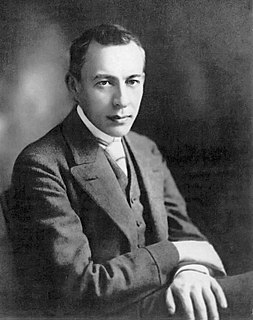
Monna Vanna is an unfinished opera by Sergei Rachmaninoff after a play by Maurice Maeterlinck. Rachmaninoff had completed Act I in short vocal score, with piano accompaniment, and then he went to ask for permission to set the text in a full three-act treatment. However, another composer, Henry Février, had by then received the rights to an operatic setting of the text. Had Rachmaninoff proceeded to a complete operatic setting, such a work could not have been produced in European countries that were signatories to copyright laws that covered the work of Maeterlinck. This opera could only have been produced in countries that at the time were not signatories to European copyright law, such as Russia. Ultimately, Rachmaninoff abandoned further work on this opera and never wrote a complete setting.

Arthur Edmund Carewe, born Hovsep Hovsepian, was an Armenian-American stage and film actor of the silent and early sound film era.

Lee Parry was a German film actress of the silent era. She appeared in more than 40 films between 1919 and 1939.

Emil Ábrányi was a Hungarian composer, conductor, and opera director.

Monna Vanna is a drame lyrique or opera in four acts by composer Henry Février. The opera's French libretto is by playwright Maurice Maeterlinck and is based on his play of the same name. The opera premiered on 13 January 1909 at the Académie Nationale de Musique in Paris.

Dante and Beatrice is a painting dated 1883 by the artist Henry Holiday that is on display in the Walker Art Gallery, in Liverpool, England. It is considered to be Holiday's most important painting. It is executed in oil on canvas, measuring 142.2 centimetres (56 in) by 203.2 centimetres (80 in) and was purchased by the gallery in 1884.
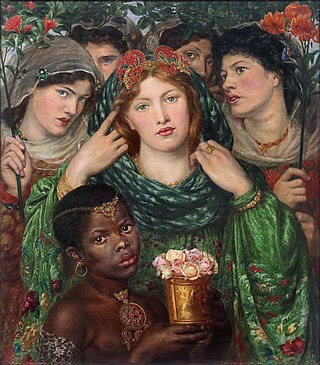
The Beloved is an oil painting on canvas by the English artist Dante Gabriel Rossetti, now in Tate Britain, London. Rossetti signed his initials and the date as "1865-6" on the bottom left of the canvas. It depicts the bride, or "beloved", from the Song of Solomon in the Hebrew Bible as she approaches her bridegroom, with her attendants.

Veronica Veronese is an oil painting by Dante Gabriel Rossetti painted in 1872 with Alexa Wilding as the model. The painting was conceived as a companion to Lady Lilith. Rossetti sold the painting to one of his best clients, shipping magnate Frederick Richards Leyland. In 1923 it was acquired by the estate of Samuel Bancroft which donated it in 1935 to the Delaware Art Museum.
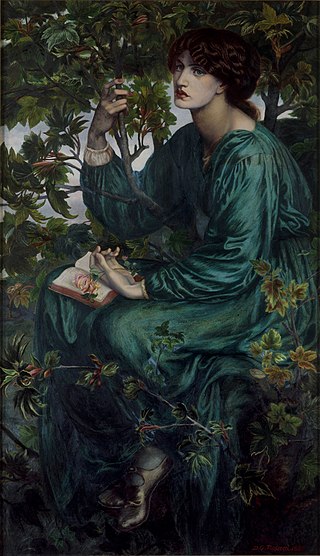
The Day Dream or, as it was initially intended to be named, Monna Primavera, is an oil-on-canvas painting by the Pre-Raphaelite Brotherhood founder member Dante Gabriel Rossetti. The work, which measures 158.7 centimetres (62.5 in) high by 92.7 centimetres (36.5 in) wide, was undertaken in 1880 and depicts Jane Morris in a seated position on the bough of a sycamore tree. In her hand is a small stem of honeysuckle – a token of love in the Victorian era – that may be an indication of the secret affair the artist was immersed in with her at the time. The artwork was left to the Victoria and Albert Museum by Constantine Alexander Ionides in 1900.

Monna Vanna is a 1922 German silent historical film directed by Richard Eichberg and starring Lee Parry, Paul Wegener, and Hans Stürm.
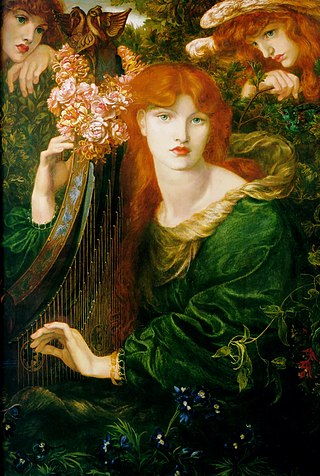
La Ghirlandata("The Garlanded Woman") is an 1873 painting by English painter and poet Dante Gabriel Rossetti. It is currently in the collection of the Guildhall Art Gallery in London, United Kingdom. The model who sat for the painting was Alexa Wilding. May Morris was the model for both angel heads in the top corners of the painting.
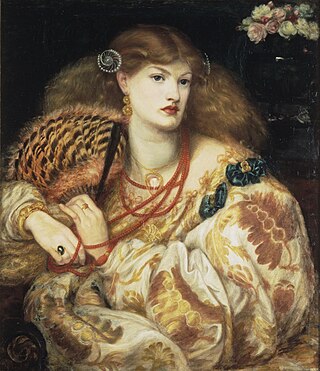
Monna Vanna is an 1866 oil on canvas painting by Dante Gabriel Rossetti. It was acquired by the collector William Henry Blackmore and later entered the collection of George Rae, one of Rossetti's patrons. It later passed from Rae to the joint ownership of Arthur Du Cros and Otto Beit and it was purchased from them by the Tate Gallery in 1916 via the NACF – it is now in the collection of Tate Britain in London.
George Rae (1817–1902) was a British banker and stockbroker based in Birkenhead. He is most notable for his patronage of the Pre-Raphaelite Brotherhood and his commissioning and acquisition of works by Ford Madox Brown, Arthur Hughes and Dante Gabriel Rossetti. His commissions included Rossetti's The Beloved, commissioned in 1863 for £300 but only completed two years later. He later owned Rosetti's Monna Vanna.

La Joconde nue or Monna Vanna is a 1514–1516 charcoal drawing with white highlights by the school of Leonardo da Vinci. It is a semi-nude portrait of a woman, 28-by-21 inch in size. The position of the subject's hands and body are almost identical to that of Leonardo's Mona Lisa, leading some experts to suggest this work may be a preparatory drawing for the famous painting. These experts identify this as an exceptionally fine work by a left-handed master, leading to speculation that it is the work of Leonardo himself. The work has been held by the Condé Museum in Chantilly, France, since 1862.
















